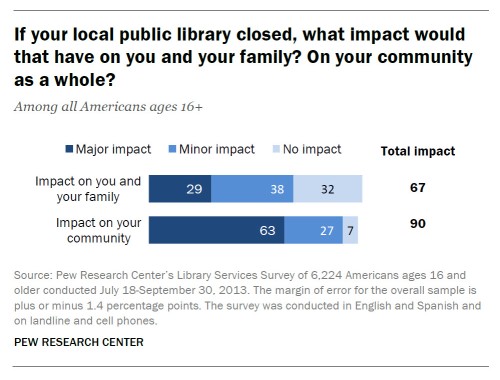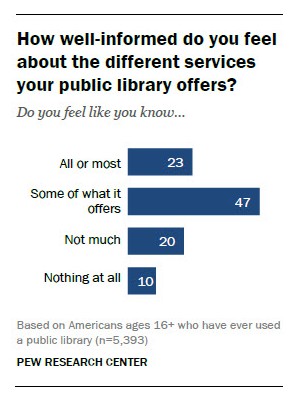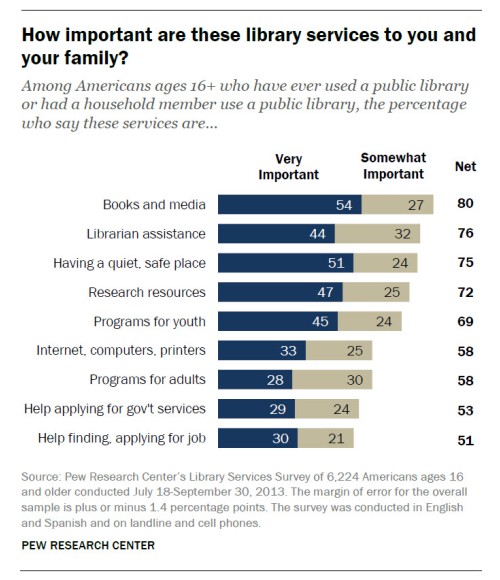Pew Report: Public Libraries' Importance and Impact
 Washington (December 11, 2013) – Most Americans feel that public libraries have done a good job embracing new technology, but are split on whether libraries are as essential as they were in the past for finding information.
Washington (December 11, 2013) – Most Americans feel that public libraries have done a good job embracing new technology, but are split on whether libraries are as essential as they were in the past for finding information.
In a larger sense, Americans strongly value the role of public libraries in their communities, both for providing access to materials and resources and for improving the overall quality of life in their communities. Many library resources are particularly valued by those who are unemployed, retired, or searching for a job, as well as those living with a disability and internet users who lack home internet access.
These are some of the highlights of a nationally representative Pew Research Center survey of 6,224 Americans ages 16 and older, which was in the field from July 18-September 30, 2013. The survey was conducted on landline and cell phones, and in English and Spanish. The margin of error for the entire sample is plus or minus 1.4 percentage points.
Public libraries and technology
By a 55%-34% margin, Americans say they think public libraries have kept up with technological change. And at a time when three in ten adults in the U.S. lack a home broadband connection, including 15% who don’t use the internet at all, almost half Americans say public libraries are still as important as they used to be for accessing information: 52% of Americans said that people do not need libraries as much as they used to because they can find most information on their own, but 46% disagreed with that statement. In addition:
- 95% of Americans agree that the materials and resources available at public libraries play an important role in giving everyone a chance to succeed.
- 81% of Americans ages 16 and older say that public libraries provide many services people would have a hard time finding elsewhere.
 The percentage who have visited in person is down, but website use has increased
The percentage who have visited in person is down, but website use has increased
The survey also found that while the percentage of Americans who have recently visited a public library in person decreased slightly, the proportion who have used a library website in the past year has increased:
- 48% of Americans have visited a library or bookmobile in person in the past year, down from 53% in November 2012.
- 30% of Americans have visited a library website in the past year, up from 25% in 2012.
Taken together, this means that 54% of Americans have used a public library in the past year, down from 59% in 2012.
Public libraries' importance and impact
As in previous surveys, Americans say that public libraries are important not only to themselves and their families, but also to their wider communities.
Some 90% of Americans ages 16 and older said that the closing of their local public library would have an impact on their community, with 63% saying it would have a "major" impact. Responding to a separate question, 94% of Americans said that having a public library improves the quality of life in a community.
Asked about the personal impact of a public library closing, two-thirds (67%) of Americans said it would affect them and their families, including 29% who said it would have a major impact.
"Throughout our work, we’ve found that Americans value public libraries not only for the access to information they offer through books, databases, and internet connections, but also their assistance in finding and navigating the increasing amount of information that is available," said Kathryn Zickuhr, Research Associate at the Pew Research Center's Internet Project and lead author of the report. "And even people who don’t rely on public libraries as much in their own lives say they value libraries as important resources for the community at large."
Importance of individual services and resources
 Americans are most likely to say they strongly value having access to books and media; having a quiet, safe place to spend time, read, or study; and having librarians to help people find information. Other services, such as assistance finding and applying for jobs, are more important to particular groups, including those with lower levels of education or household income.
Americans are most likely to say they strongly value having access to books and media; having a quiet, safe place to spend time, read, or study; and having librarians to help people find information. Other services, such as assistance finding and applying for jobs, are more important to particular groups, including those with lower levels of education or household income.
Libraries are also particularly valued by those who are unemployed, retired, or searching for a job, as well as those living with a disability and internet users who lack home internet access:
- 56% of Americans who use the internet but lack a connection at home say access to library computers, internet, and printers is “very important” to them and their families, compared with 33% of all respondents.
- 49% of unemployed and retired respondents say they consider librarian assistance in finding information to be “very important,” vs 41% of employed respondents.
- 47% of job seekers say the assistance they receive at libraries in finding or applying for a job is “very important” to them and their families.
- 40% of those living with a disability say the assistance they receive at libraries in applying for government services is “very important,” vs 27% of those without a disability.
View the Full Report: http://libraries.pewinternet.org/2013/12/11/libraries-in-communities/
About the Pew Research Center
The Pew Research Center is a nonpartisan fact tank that informs the public about the issues, attitudes and trends shaping America and the world. It does not take policy positions. It conducts public opinion polling, demographic research, media content analysis and other empirical social science research. The center studies U.S. politics and policy views; media and journalism; internet and technology; religion and public life; Hispanic trends; global attitudes and U.S. social and demographic trends. All of the center’s reports are available at pewresearch.org. The Pew Research Center is a subsidiary of The Pew Charitable Trusts.
Media contact: Kathryn Zickuhr, Research Associate, Pew Research Center’s Internet Project
[email protected] or (202) 419-4518
